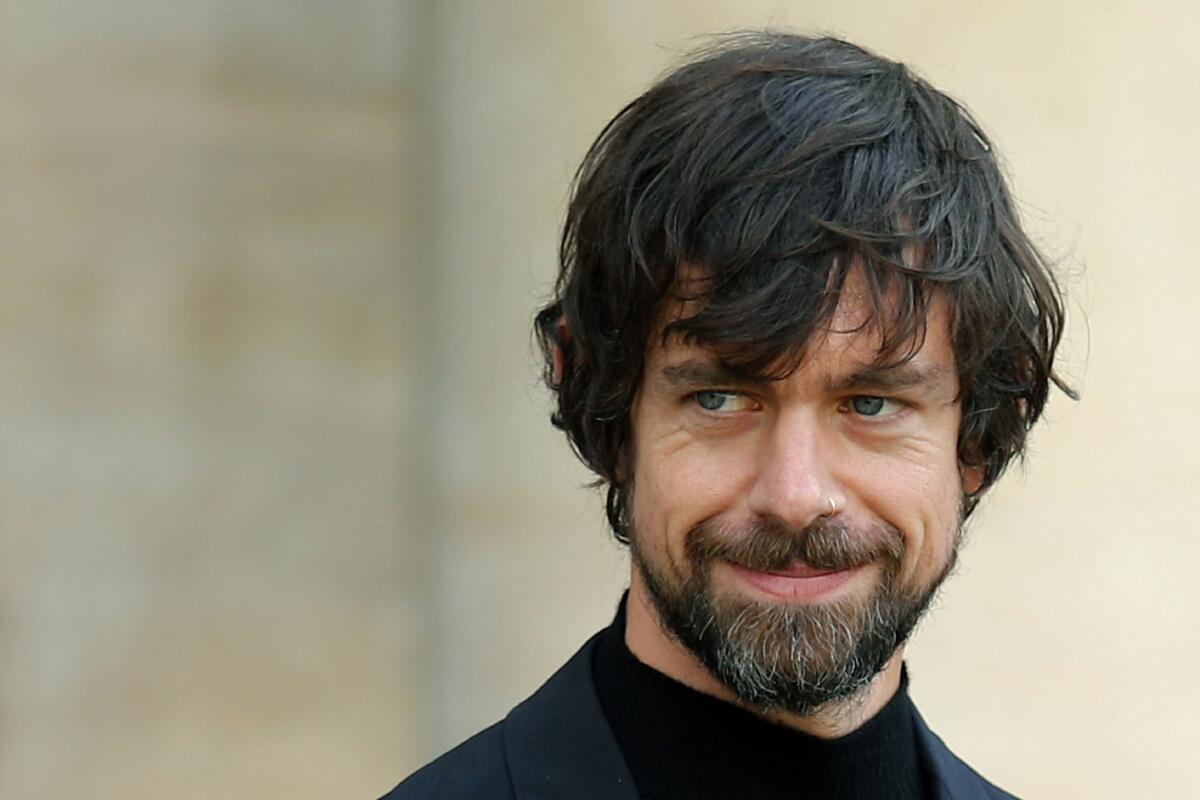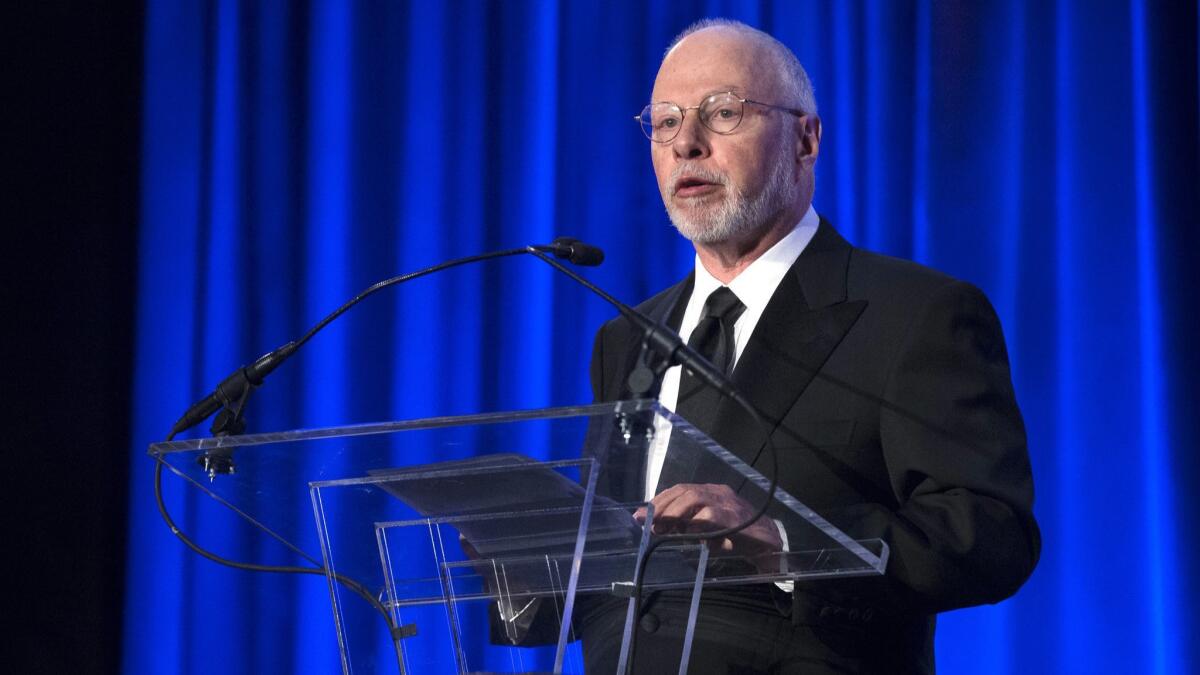Twitter CEO Jack Dorsey faces a moment of reckoning

- Share via
When Jack Dorsey returned to lead Twitter in 2015, it seemed to come straight from the Silicon Valley storybook.
Just as Dorsey’s idol Steve Jobs had two decades earlier at Apple, the co-founder of an admired brand with an unloved stock would take back control and restore it to its former glory.
One Wall Street agitator, however, does not buy into Silicon Valley’s “cult of the founder.” Elliott Management, the activist hedge fund led by Paul Singer, is pushing for Dorsey to be replaced after taking a $1-billion stake in Twitter.
In particular, Elliott objected to the fact that Dorsey is simultaneously chief of Twitter and of Square, the payments company he co-founded in 2009 — and yet he had planned to spend several months this year living in Africa, rather than staying in San Francisco, where both companies are based. (Twitter quoted Dorsey on Thursday as saying that in light of the coronavirus “and everything else going on” he would “re-evaluate” that plan.)
“It begins and ends with the leadership,” said one person familiar with the situation. “You have a company that is entering a period of incredible importance, including the upcoming political election, and you have a part-time CEO that runs a larger publicly traded company.”
Activist investor Elliott Management wants Twitter to have the focus of a full-time CEO. Jack Dorsey splits his time between Twitter and Square.
While Facebook’s valuation has doubled in the last four and a half years, despite all the turbulence that followed the 2016 election, Twitter’s share price had increased less than 10% between Dorsey’s appointment as permanent chief in October 2015 and the end of last week, before Elliott’s intervention was revealed.
Since the first quarter of 2017, Facebook’s advertising revenue per daily active user has increased by 72% — three times as much as Twitter’s — while its net operating margin of 34% for 2019 eclipsed Twitter’s 11%.
Elliott’s demands — which include nominating four board members to Twitter’s board — come as multiple former employees complain that the company’s chaotic internal culture and a lack of clear decision-making from Dorsey has stunted its revenue growth and ability to clean up abuse from the app.
The company must act urgently, critics argue, given its role in the democratic process during the 2020 election as a platform for politicians.
“What you get with founders is they completely understand the company,” one long-standing investor said. “But often they are not the person to take it to the next level.”
Twitter declined to comment.
In recent years, Dorsey has cemented his legacy as a quietly thoughtful and likable eccentric, with many column inches dedicated to his propensity toward wellness trends such as meditation, ice baths and fasting. This guru-like quality — he has been dubbed Silicon Valley’s answer to Gwyneth Paltrow in the press — has translated into a hands-off management style with mixed results for the company: thoughtful, yet easily distracted.
“There was a strange balance with Jack. When he was there, he was remarkably accessible . . . and always warm and welcoming,” one former staffer said. “But there was almost a sense that maybe Jack shouldn’t have been so nice.”
Dorsey’s achievements at Twitter have been significant, with even his critics crediting him with restoring the company’s mission and sense of purpose, which was so lacking in 2015 that its leadership team could not agree on what the service was actually for.
Meanwhile, he has made some progress in tackling the abuse and bullying that was so rife on Twitter that it discouraged Bob Iger, then Disney’s chief executive, from a potential acquisition of the company in 2016. “The nastiness is extraordinary,” Iger told the New York Times last year.
However, critics inside and outside the company say that while arch rival Facebook has undergone several transformations in the last decade, Twitter has failed to evolve, either as a product or a business. Notable missteps include efforts to push into new video formats with its Periscope and Vine apps, which faltered despite the subsequent success of TikTok, a platform that strongly resembles Vine’s short, quirky clips.

Former senior executives say that while audience growth has regained momentum, the company has failed to successfully monetize it, with its offer to advertisers severely lagging behind its larger rivals’.
“[Twitter needs] stronger sales [and] revenue product leadership . . . The execution of the revenue product team [is] slow and light years behind the Facebook and Instagram ad product,” said one.
Meanwhile, recent employees describe the company internally as often disorganized and paralyzed by indecision. Another former senior executive said the inertia was caused in part by Dorsey presiding over a “bottom-up” corporate culture — in which the staff, typically in their early twenties, are encouraged to hold regular open discussions but are too hesitant to offend one another. That has limited the pace of product innovation.
“It’s locked in a cycle of social restraint and a lack of direction from the top,” the person said. “It takes the slightest concern for paralysis to fall into place, which is why they don’t put out [new] features.”
Others say the culture is also to blame for the company’s travails when it comes to tackling election disinformation on the site. “The fastest way to silence a room is to bring up that topic,” another former employee said.
Not only is Dorsey’s effectiveness as a leader in question when he does spend time at Twitter, but some investors and employees are concerned that he is away from San Francisco so often.
The latest worry was his apparent plan to move to Africa for as long as six months this year. While in Ethiopia’s capital city, Addis Ababa, Dorsey tweeted that he planned to return to Africa in mid-2020 for three to six months, to explore opportunities in cryptocurrencies.
That left some Twitter shareholders wondering how the entrepreneur planned to run two companies while also being on a different continent and timezone, despite having a strong finance chief in Ned Segal. “You cannot turn round to investors and say you have two jobs — that’s half the time you’re not making Twitter better,” said one investor.
(Dorsey said at a Morgan Stanley investment conference Thursday that he made a mistake in not explaining why he wanted to go to Africa. He wanted to understand Africa’s nascent internet market.)
Despite the internal gripes, news of Elliott’s assault prompted an outpouring of public support from Twitter employees. “#WeBackJack because he backs us,” tweeted God-is Rivera, global director of culture and community at Twitter. “Our mission is bigger than just profit.”
Dorsey’s advocates argue that replacing him would be difficult given Twitter’s quirky culture and the loyalty shown to him by its rank-and-file employees. One compromise could be the appointment of a chief operating officer — a role that has not been filled for two years — akin to Facebook’s Sheryl Sandberg, who has been a key ally to founder Mark Zuckerberg.
“What you really need is a Sheryl,” said Rich Greenfield, analyst at LightShed. “I don’t think you can remove [Dorsey] without doing tremendous damage.”
Steve Jobs succeeded at running Apple while also leading Pixar, the digital animation studio, for several years. But while Jobs turned out hits such as the iMac and iPod, Dorsey has yet to produce the innovation that can silence the doubters.
“The only way to keep the wolves at bay is if you’re doing so well that you are outperforming everyone else,” the shareholder said. “But Twitter hasn’t done that.”
© The Financial Times Ltd. 2020. All rights reserved. FT and Financial Times are trademarks of the Financial Times Ltd. Not to be redistributed, copied or modified in any way.
More to Read
Inside the business of entertainment
The Wide Shot brings you news, analysis and insights on everything from streaming wars to production — and what it all means for the future.
You may occasionally receive promotional content from the Los Angeles Times.











